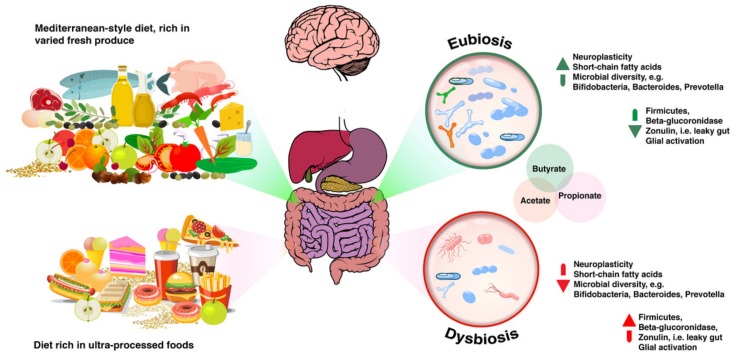Figure 2.
Dietary patterns that are rich in fresh produce, including a variety of brightly-coloured vegetables and fruits, olive oil, nuts and seeds, e.g., a Mediterranean-style diet, are seen to promote eubiosis, contributing to higher levels of all three short chain fatty acids and to a wider microbial diversity, with lower relative abundance in Firmicutes. Other characteristics of a eubiotic gut ecosystem include lower levels of beta-glucuronidase, documented to help with normal elimination of toxicants, and lower zonulin levels, seen as an indication of reduced susceptibility of damage to the intestinal barrier, i.e., less “leaky gut”. In this scenario, less glial activation is observed, resulting in decreased oxidative stress and increased neuroplasticity. On the other hand, dietary patterns rich in ultra-processed foods, and particularly those rich in refined carbohydrates combined with high fat levels are seen to promote gut dysbiosis. Lower microbial diversity, as well as lower levels of short chain fatty acid levels are seen in patients whose diets consist of mostly of ultra-processed foods, with higher relative abundance of Firmicutes. Other markers are also affected. Beta-glucuronidase may be higher, which could pose issues with toxicant elimination via reduced activity of phase II detoxification pathways. There is also a higher susceptibility for barrier tissue damage. Higher zonulin levels in stool would give practitioners an indication that this is the case. A disrupted intestinal barrier tends to be correlated with increased free radical damage to brain tissue, thereby increasing the chances of neurodegeneration, as well as anxiety, depression and other psychiatric disorders.

